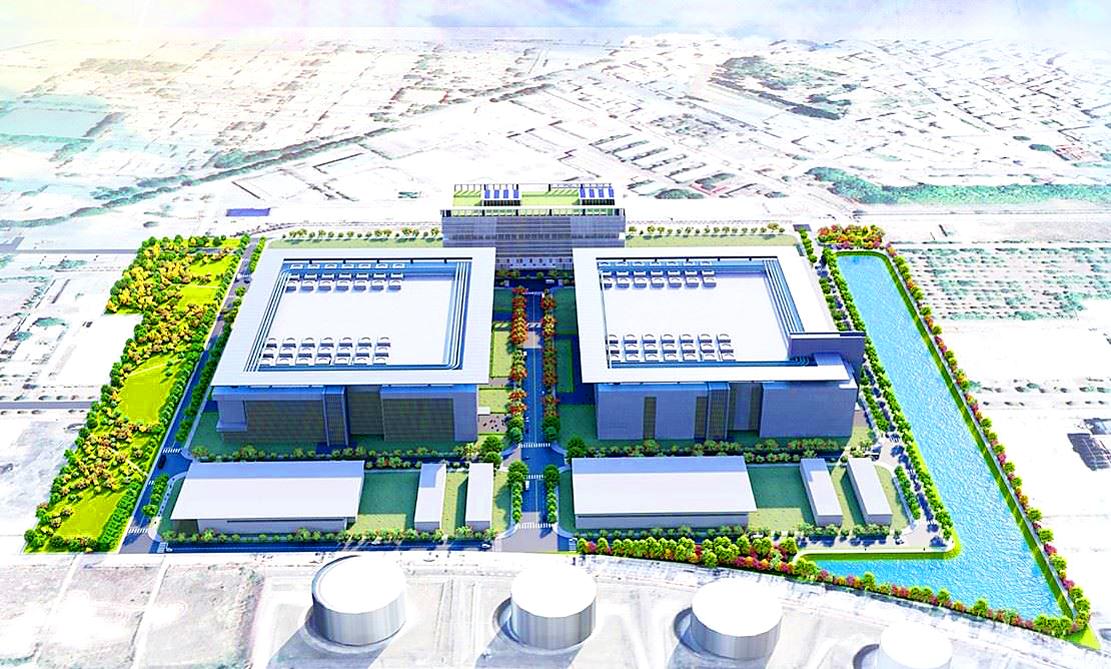Taiwan Semiconductor Manufacturing Co (TSMC, 台積電) yesterday said that the construction of a planned 12-inch wafer plant in Kaohsiung would start later this year.
The chipmaker’s comments came after the Kaohsiung City Government invited the company to attend a groundbreaking ceremony on Sunday at the Nanzih Technology Industrial Park (楠梓科技產業園區), where the new plant is to be built.
The park would sit on the former site of a naphtha cracking plant owned by state-owned oil refiner CPC Corp, Taiwan (台灣中油).

Photo courtesy of the Kaohsiung City Government Economic Development Bureau
Kaohsiung Mayor Chen Chi-mai (陳其邁) yesterday did not confirm whether work on the Nanzih industrial park would begin on Sunday, but said it would start this month.
The city government said in a statement that TSMC’s presence in the industrial park is expected to help the city establish a semiconductor cluster within five years, which would boost high-end semiconductor technology development and cultivate a talent pool for the industry.
The semiconductor supply chain in Kaohsiung is expected to create more than 45,000 jobs, and speed up the pace of development not only in the manufacturing sector, but also in the service and commercial sectors, it said.
The world’s largest contract chipmaker unveiled its plans for the Kaohsiung plant in November last year.
The plant is to use the advanced 7-nanometer process and the mature 28-nanometer process to produce chips, with production scheduled to begin in 2024.
Chips made using the 7-nanometer process are expected to be used in emerging technologies such as high-performance computing devices, while chips made with the 28-nanometer process would likely be destined for automotive electronic applications, analysts said.
While TSMC has not disclosed any financial terms for the new facility, analysts said it could cost NT$200 billion to NT$300 billion (US$6.67 billion to US$10 billion).
The proposed plant passed an environmental impact assessment in April. It is expected to create 1,500 jobs, with an annual production value of NT$157.6 billion.
The city government said that since Chen assumed the post of Kaohsiung mayor in August 2020 after winning a by-election, the city had as of the end of April attracted NT$498.1 billion in investments.
Other major technology companies, such as Win Semiconductors Corp (穩懋半導體) and Germany-based Merck Group, have pledged to invest in Kaohsiung.

Shares in Taiwan closed at a new high yesterday, the first trading day of the new year, as contract chipmaker Taiwan Semiconductor Manufacturing Co (TSMC, 台積電) continued to break records amid an artificial intelligence (AI) boom, dealers said. The TAIEX closed up 386.21 points, or 1.33 percent, at 29,349.81, with turnover totaling NT$648.844 billion (US$20.65 billion). “Judging from a stronger Taiwan dollar against the US dollar, I think foreign institutional investors returned from the holidays and brought funds into the local market,” Concord Securities Co (康和證券) analyst Kerry Huang (黃志祺) said. “Foreign investors just rebuilt their positions with TSMC as their top target,

REVENUE PERFORMANCE: Cloud and network products, and electronic components saw strong increases, while smart consumer electronics and computing products fell Hon Hai Precision Industry Co (鴻海精密) yesterday posted 26.51 percent quarterly growth in revenue for last quarter to NT$2.6 trillion (US$82.44 billion), the strongest on record for the period and above expectations, but the company forecast a slight revenue dip this quarter due to seasonal factors. On an annual basis, revenue last quarter grew 22.07 percent, the company said. Analysts on average estimated about NT$2.4 trillion increase. Hon Hai, which assembles servers for Nvidia Corp and iPhones for Apple Inc, is expanding its capacity in the US, adding artificial intelligence (AI) server production in Wisconsin and Texas, where it operates established campuses. This

Nvidia Corp chief executive officer Jensen Huang (黃仁勳) on Monday introduced the company’s latest supercomputer platform, featuring six new chips made by Taiwan Semiconductor Manufacturing Co (TSMC, 台積電), saying that it is now “in full production.” “If Vera Rubin is going to be in time for this year, it must be in production by now, and so, today I can tell you that Vera Rubin is in full production,” Huang said during his keynote speech at CES in Las Vegas. The rollout of six concurrent chips for Vera Rubin — the company’s next-generation artificial intelligence (AI) computing platform — marks a strategic

US President Donald Trump on Friday blocked US photonics firm HieFo Corp’s US$3 million acquisition of assets in New Jersey-based aerospace and defense specialist Emcore Corp, citing national security and China-related concerns. In an order released by the White House, Trump said HieFo was “controlled by a citizen of the People’s Republic of China” and that its 2024 acquisition of Emcore’s businesses led the US president to believe that it might “take action that threatens to impair the national security of the United States.” The order did not name the person or detail Trump’s concerns. “The Transaction is hereby prohibited,”